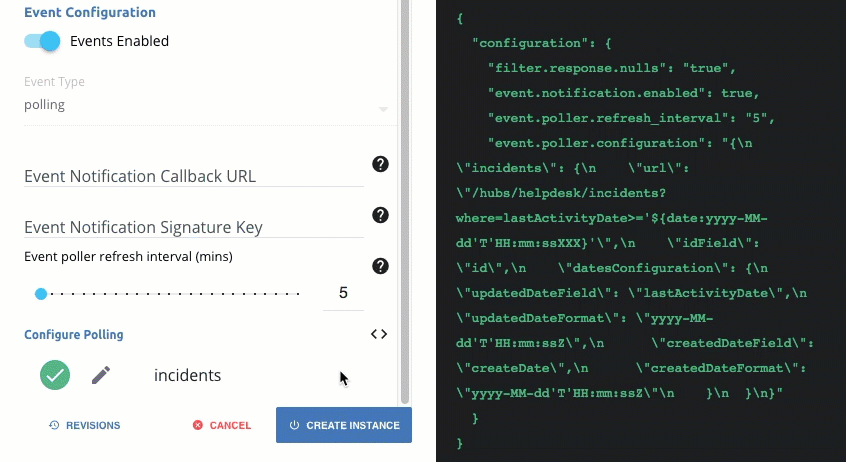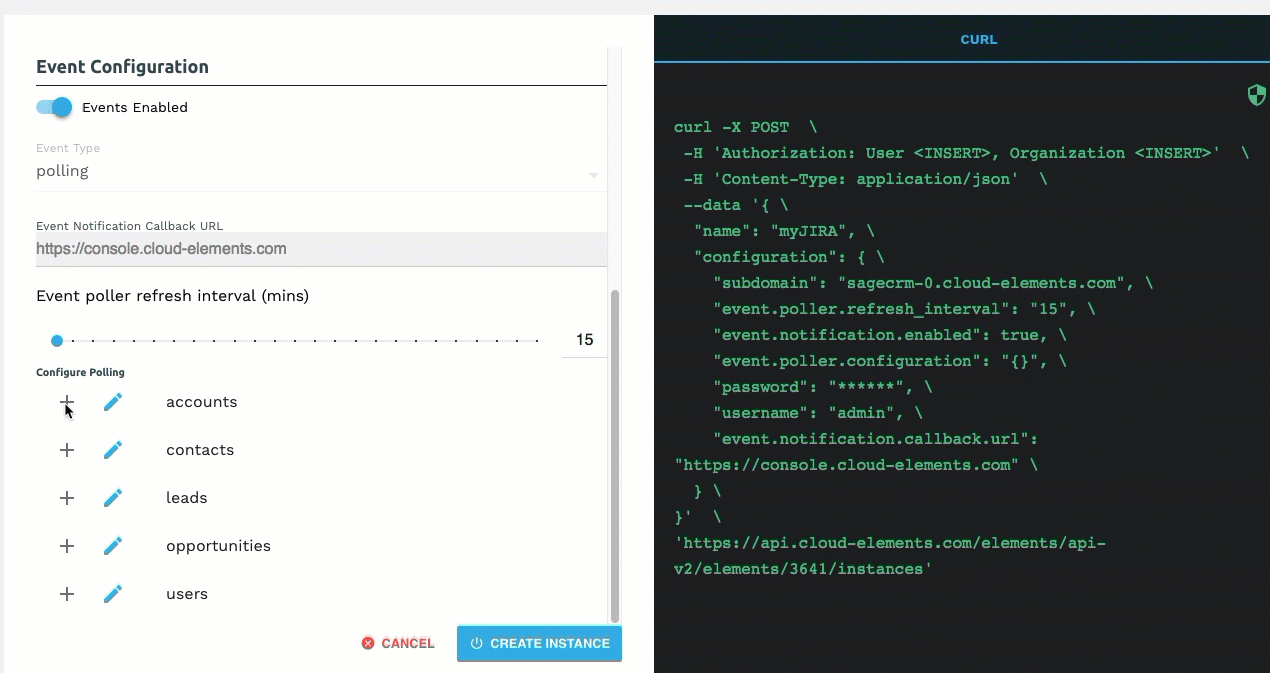NetSuite 2016 ERP
Events
Cloud Elements supports events via polling or webhooks depending on the endpoint. If you would like to see more information on our Events framework, please see the Event Management Guide.
Supported Events and Resources
Cloud Elements supports polling events for NetSuite 2016 ERP.
You can set up events for the following resources:
- Customers
- Employees
- Estimates
- Invoices
- Journal-entries
- Payments
- Products
- Purchase-orders
- Time-activities
- Vendor-payments
- Vendors
Polling
You can configure polling through the UI or in the JSON body of the /instances API call.
Configure Polling Through the UI
For more information about each field described here, see Parameters.
To authenticate an element instance with polling, sign in to Cloud Elements, and then create a new element instance as described in authentication. During configuration of the new instance:
- Switch Events Enabled on.
- Add an Event Notification Callback URL.
- Use the Event poller refresh interval (mins) slider or enter a number in minutes to specify how often Cloud Elements should poll for changes.
- Select the resources to poll.
- Advanced users can further configure polling:
- Click
 to edit the polling configuration JSON directly.
to edit the polling configuration JSON directly.

- Click
 to access the poller configuration.
to access the poller configuration.

- Click
Once you're done with event configuration, you can complete the steps to finish creating the instance, which will have events enabled.
Configure Polling Through API
To authenticate an element instance with polling, sign in to Cloud Elements, and then create a new element instance as described in authentication. When using the API, there are additional parameters used to enable and configure polling events on the new instance.
Example JSON with Polling
This example JSON shows the parameters that can be sent to the /instances API to enable and configure polling. The example shows configuration of polling for Customers objects, but you can set whichever types of objects that you wish.
{
"element":{
"key": "netsuiteerpv2"
},
"configuration": {
"netsuite.sandbox": false,
"netsuite.accountId": "my_account_id",
"netsuite.single.session": true,
"netsuite.single.session.key": "my_unique_key",
"authentication.type": "Basic",
"user.username": "my@somewhere.com",
"user.password": "my_secret_password",
"netsuite.appId": "my_app_id",
"event.notification.enabled": true,
"event.notification.callback.url": "http://mycoolapp.com",
"event.poller.refresh_interval": "15",
"event.poller.configuration": {
"customers": {
"url": "/hubs/finance/customers?where=lastModifiedDate>'${gmtDate:yyyy-MM-dd'T'HH:mm:ssXXX}'",
"idField": "internalId",
"filterByUpdatedDate": true,
"datesConfiguration": {
"updatedDateField": "lastModifiedDate",
"updatedDateFormat": "milliseconds",
"createdDateField": "dateCreated",
"createdDateFormat": "milliseconds"
}
}
}
},
"tags": [
"Testing"
],
"name": "NetSuite Polling"
}
Parameters
| Parameter | Description | Data Type |
|---|---|---|
Events Enabledevent.notification.enabled |
Optional. Identifies that events are enabled for the element instance.Default: false. |
boolean |
Event Notification Callback URLevent.notification.callback.url |
The URL where you want Cloud Elements to send the events. | string |
Event Poller Refresh Intervalevent.poller.refresh_interval |
A number in minutes to identify how often the poller should check for changes. | number |
Configur Pollingevent.poller.configuration |
Optional. Configuration parameters for polling. | JSON object |
<object_type> |
One or more JSON objects that correspond to configuration for that type. object_type can be customers, invoices, etc. |
JSON object |
url |
The url to query for updates to the resource. | String |
idField |
The field in the resource that is used to uniquely identify it. | String |
datesConfiguration |
Configuration parameters for dates in polling | JSON Object. |
updatedDateField |
The field that identifies an updated object. | String |
updatedDateFormat |
The date format of the field that identifies an updated object. | String |
createdDateField |
The field that identifies a created object. | String |
createdDateFormat |
The date format of the field that identifies a created object. | String |